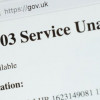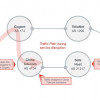CISCO 600's - More Multiple Vulnerabilities in CBOS
Multiple vulnerabilities have been identified and fixed in CBOS, an
operating system for the Cisco 600 family of routers. Cisco CBOS
Software contains a flaw that permits the successful prediction of
TCP Initial Sequence Numbers. It only affects the security of TCP
connections that originate or terminate on the affected Cisco device
itself; it does not apply to TCP traffic forwarded through the
affected device in transit between two other hosts.
Also a Cisco 600 router may stop passing the traffic and responding
to the console when an ECHO REQUEST packet with the record route
option is routed through it.... continued... Passwords, exec and
enable, are stored in the cleartext in the NVRAM. This vulnerability
is documented as Cisco bug ID CSCdt04882. When multiple, large ECHO
REPLY packets are routed through an affected Cisco 600 router, it
will enter the ROMMON mode and stop passing any further traffic.
Security Advisory: More Multiple Vulnerabilities in CBOS
Revision 1.0
For Public Release 2001 May 22 08:00 (GMT -0800)
Summary
Multiple vulnerabilities have been identified and fixed in CBOS, an operating
system for the Cisco 600 family of routers.
-
Cisco CBOS Software contains a flaw that permits the successful prediction of TCP
Initial Sequence Numbers. It only affects the security of TCP connections that
originate or terminate on the affected Cisco device itself; it does not apply to TCP
traffic forwarded through the affected device in transit between two other hosts.This vulnerability is documented as Cisco bug ID CSCds16078.
-
A Cisco 600 router may stop passing the traffic and responding to the console when
an ECHO REQUEST packet with the record route option is routed through it.This vulnerability is documented as Cisco bug ID CSCds30150.
-
Passwords, exec and enable, are stored in the cleartext in the NVRAM.
This vulnerability is documented as Cisco bug ID CSCdt04882.
-
When multiple, large ECHO REPLY packets are routed through an affected
Cisco 600 router, it will enter the ROMMON mode and stop passing any further
traffic.This vulnerability is documented as Cisco bug ID CSCds74567.
The following releases of CBOS are containing all of mentioned vulnerabilities:
2.0.1, 2.1.0, 2.1.0a, 2.2.0, 2.2.1, 2.2.1a, 2.3, 2.3.2, 2.3.5, 2.3.7 and 2.3.8.
These vulnerabilities are fixed in the following CBOS releases:
2.3.9, 2.4.1 and 2.4.2. Customers are urged to upgrade to
releases that are not vulnerable as shown in detail in the section
Software Versions and Fixes below.
This advisory is available at the
http://www.cisco.com/warp/public/707/CBOS-multiple2-pub.html.
Affected Products
The affected models are: 627, 633, 673, 675, 675E, 677, 677i and 678.
These models are vulnerable if they run any of the following, or earlier,
CBOS releases: 2.0.1, 2.1.0, 2.1.0a, 2.2.0, 2.2.1, 2.2.1a, 2.3,
2.3.2, 2.3.5, 2.3.7 and 2.3.8.
No other releases of CBOS software are affected by these vulnerabilities. No other
Cisco products are affected by these vulnerabilities.
These vulnerabilities are fixed in the following CBOS releases: 2.3.9, 2.4.1 and 2.4.2.
Details
- CSCds16078
- See also
http://www.cisco.com/warp/public/707/ios-tcp-isn-random-pub.shtmlTCP sequence numbers are 32-bit integers in the circular range of 0 to
4,294,967,295. The host devices at both ends of a TCP connection exchange an
Initial Sequence Number (ISN) selected at random from that range as part of the
setup of a new TCP connection.This method provides reasonably good protection against accidental receipt of
unintended data. However, to guard against malicious use, it should not be possible
for an attacker to infer a particular number in the sequence. If the initial sequence
number is not chosen randomly or if it is incremented in a non-random manner between
the initialization of subsequent TCP sessions, then it is possible, with varying
degrees of success, to forge one half of a TCP connection with another host in order
to gain access to that host, or hijack an existing connection between two hosts in
order to compromise the contents of the TCP connection. To guard against such
compromises, ISNs should be generated as randomly as possible.
- CSCds30150
- By sending ICMP ECHO REQUEST packets (ping) with the IP Record Route
option set it is possible to freeze a Cisco 600 router. This can be done either
by sending the specially crafted packet or by specifying the "-r" option
on the most ping programs.The packet should not be destined to a router itself.
- CSCdt04882
- The exec and enable passwords are stored in the cleartext in NVRAM. Similarly,
they are also stored in the cleartext in the configuration file if one is stored
on a computer. Anyone who is in a position to see a router's configuration, either
directly from the device or in the file on a computer, can learn the passwords.This vulnerability is corrected by storing only an MD5 hash of
the password in both NVRAM and in the configuration file, and
the plaintext password itself is never retained.
- CSCds74567
- When multiple ICMP ECHO REPLY packets, non standard size, are passed
through the affected device the device will stop passing any further traffic.
Packets must be larger than the usual size (64 bytes) but that can be easily
accomplished either by crafting packets or by adjusting the response size,
either via command line or by modifying the program source.
Impact
- CSCds16078
- Forged packets can be injected into a network from a location outside its
boundary so that they are trusted as authentic by the receiving host, thus resulting
in a failure of integrity. Such packets could be crafted to gain access or make some
other modification to the receiving system in order to attain some goal, such as
gaining unauthorized interactive access to a system or compromising stored data.>From a position within the network where it is possible to receive the return traffic
(but not necessarily in a position that is directly in the traffic path), a greater
range of violations is possible. For example, the contents of a message could be
diverted, modified, and then returned to the traffic flow again, causing a failure
of integrity and a possible failure of confidentiality.NOTE: Any compromise using this vulnerability is only possible for TCP sessions
that originate or terminate on the affected Cisco device itself. It does not apply
to TCP traffic that is merely forwarded through the device.
- CSCds30150
- It is possible to cause the Denial-of-Service.
- CSCdt04882
- Anyone who is in a position to see a router's configuration, either
directly from the device or in the file on a computer, can learn the exec
and enable passwords. Armed with that knowledge, an attacker can log into the
device and change the router's configuration.This vulnerability can be even more dangerous if the ISP is using the same
passwords for all of the devices which it manages. Such practice, using the same
passwords for multiple devices, is strongly discouraged.
- CSCds74567
- It is possible to cause the Denial-of-Service to many affected devices.
The following table summarizes the CBOS software releases affected by the
vulnerabilities described in this notice and scheduled dates on which the earliest
corresponding fixed releases will be available.
Major Release
Description or Platform
Availability of Repaired Releases
General Availability (GA)
All releases
All platforms
2.3.9
2001-MAR-19
All releases
All platforms
2.4.1
2000-DEC-11
All releases
All platforms
2.4.2
2001-MAY-14
Obtaining Fixed Software
Cisco is offering free software upgrades to eliminate this vulnerability for all
affected customers.
Customers with contracts should obtain upgraded software through their regular
update channels. For most customers, this means that upgrades should be obtained
via the point-of-sale or, if they posses a Cisco Connection Online account, they can
download it from the Software Center on Cisco's Worldwide Web site at
http://www.cisco.com.
Customers without contracts should get their upgrades by contacting the Cisco
Technical Assistance Center (TAC). TAC contacts are as follows:
- +1 800 553 2447 (toll-free from within North America)
- +1 408 526 7209 (toll call from anywhere in the world)
- e-mail: tac@cisco.com
Give the URL of this notice as evidence of your entitlement
to a free upgrade. Free upgrades for non-contract customers must be requested
through the TAC.
Please do not contact either "psirt@cisco.com" or
"security-alert@cisco.com" for software upgrades.
Workarounds
- CSCds16078
- There is no workaround.
- CSCds30150
- There is no workaround.
- CSCdt04882
- There is no workaround.
- CSCds74567
- There is no workaround.
Exploitation and Public Announcements
Vulnerabilitiy CSCds30150 has been made public on VULN-DEV list.
Altough we have not seen public discussion of vulnerability CSCdt04882
we understand that it is commonly known among users.
Vulnerability CSCds74567 has been reported to us by a customer.
This is a final notice. Although Cisco cannot guarantee the accuracy of
all statements in this notice, all of the facts have been checked to
the best of our ability. Cisco does not anticipate issuing updated
versions of this notice unless there is some material change in the
facts. Should there be a significant change in the facts, Cisco may
update this notice.
This notice will be posted on Cisco's Worldwide Web site at
http://www.cisco.com/warp/public/707/CBOS-multiple2-pub.html. In addition to
Worldwide Web posting, a text version of this notice is clear-signed
with the Cisco PSIRT PGP key and is posted to the following e-mail and
Usenet news recipients:
- cust-security-announce@cisco.com
- bugtraq@securityfocus.com
- first-teams@first.org (includes CERT/CC)
- cisco@spot.colorado.edu
- comp.dcom.sys.cisco
- firewalls@lists.gnac.com
- Various internal Cisco mailing lists
Future updates of this notice, if any, will be placed on Cisco's
Worldwide Web server, but may or may not be actively announced on
mailing lists or newsgroups. Users concerned about this problem are
encouraged to check the URL given above for any updates.









































































